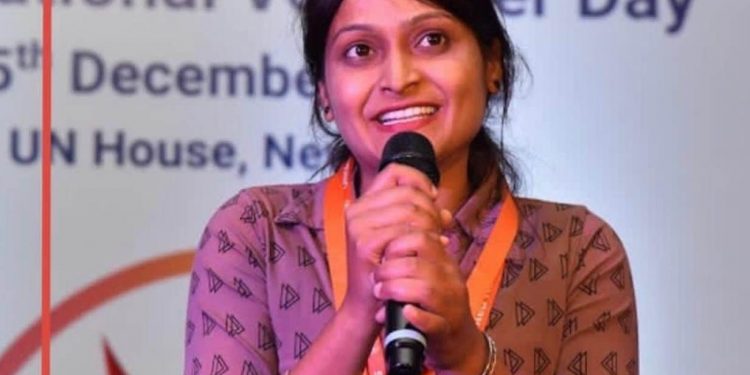The menstrual cycle may not be an issue for women in urban areas, but in rural areas, it is still considered a curse by uneducated women, says Shalini Sahu. An advocate of menstrual hygiene and a firm opponent of child marriages, Shalini received the Best Volunteer Award at a function organised December 5 in New Delhi on International Volunteers Day by the Ministry of Youth Affairs and Sports supported by UNDP, UNICEF and UN volunteers.
Shalini, who belongs to Jengera in Nuapada district, says people in her village follow a cruel custom when girls reach puberty. She says, “Menstruating girls are made to sleep in cowsheds or separately for seven days. Nobody is allowed to come into contact with them and they are not allowed into the house until their period is over. They are treated like untouchables. It really made me feel bad. However, I had a different story when I experienced menarche. I am from a farmer’s family, and my broadminded parents did not impose these restrictions on me and let me live my life on my terms. However, the plight of many of the village girls disturbed me and I wanted to change the society’s approach to menstruation. I made it a mission to promote menstrual hygiene and end the taboos and stigma attached to it.”
In 2016, Shalini joined a training programme sponsored by Asha Odisha and Save the Children that sought to improve menstrual hygiene in rural pockets and empower girls and women by raising awareness among them regarding the issue. The project taught women how to manage menstrual hygiene and use sanitary pads properly. Shalini was chosen as a discussion leader due to her will power and determination to change the prevailing practice in her village and nearby localities.
Shalini thinks the biggest barrier for women and girls to maintain menstrual hygiene is lack of awareness and the unavailability as well as high cost of sanitary pads, besides socially restrictive practices. She feels that awareness about menstruation being just a physiological process should be created also among men, religious leaders and health workers so that they can address the issue. In the countryside, women use ordinary cloth during menstruation and don’t wash and dry them properly after use. So, Shalini organised village meetings in collaboration with local health workers through a project ‘Ananya’. The project is being implemented in the Nuapada and Kandhamal districts in Odisha. With the help of some health workers, she staged skits and street plays to create awareness on menstruation and sexual and reproductive health rights. Women’s groups were educated on the proper usage and disposal of sanitary pads.
Recalling an interesting incident, she says, there was a girl named Hirondi Nisaj in Beheradihi village. Her parents were not keen to send her to the meeting. “When she failed to attend the meeting repeatedly, I went and talked to her parents and persuaded them to to send her for a three-day training programme. We taught her first about body parts. She was initially shy and hesitant to name all her body parts. In the meeting, we make the village women speak up publicly. After attending the programme, we discovered a new Hirondi. She decided to organise women and create awareness among them. And she is now working as a discussion leader.”
“When we were staging a skit in Beheradihi as part of our measures to get rid of the taboo of menstruation, a few women left the place abusing me. However, I did not pay heed,” Shalini continues.
“I have visited 20 villages where I found that girls and women living there did not have access to safe menstrual hygiene products. I conducted hygiene camps with an aim to create awareness among women on adopting hygienic practices. Besides, I gave them tips on how to minimise reproductive tract infections. Earlier, they used cloth during periods. They were unaware of the fact that they could get sanitary napkins free of cost from health workers. Thanks to our joint efforts, most village women have started using sanitary napkins during their period. Recently, Save the Children organisation conducted a rally to create awareness in this regard which was joined by 445 girls of Nuapada. Eminent social activist Tulasi Munda graced the occasion and lauded our efforts.”
Shalini’s achievements do not end here. She has stopped 10 child marriages in Nuapada district. “I feel proud of that. What life would these girls have after getting married? At least, now they can focus on education,” she says.
Shalini, who is a recipient of the Change maker award, works as a teacher at Aryan Public School. She says, “Receiving the prize for best volunteer is the proudest moment in my life. A total of ten youths from India were chosen as best volunteers and I was shortlisted as one of two from Odisha. When I started working on creating awareness on periods, people in my locality laughed at me and said many things behind my back. But when I made my hometown proud, the same people clapped for me.”
RASHMI REKHA DAS, OP







































